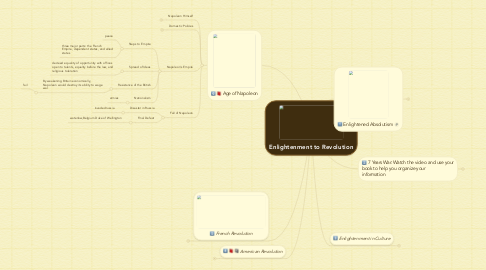
1. Age of Napoleon
1.1. Napoleon Himself
1.1.1. scholarship for military school
1.1.2. military
1.1.3. consul and emporer
1.2. Domestic Policies
1.2.1. The Church
1.2.1.1. created peace with the curch
1.2.2. Codification of Laws
1.2.2.1. seven code of law
1.2.2.2. Napoleanic code
1.2.3. Bureaucracy
1.2.3.1. government careers
1.3. Napoleon's Empire
1.3.1. Steps to Empire
1.3.1.1. peace
1.3.1.2. three major parts: the French Empire, dependent states, and allied states
1.3.2. Spread of Ideas
1.3.2.1. decreed equality of opportunity with offices open to talents, equality before the law, and religious toleration
1.3.3. Resistance of the British
1.3.3.1. By weakening Britain economically, Napoleon would destroy its ability to wage war
1.3.3.1.1. fail
1.3.4. Nationalism
1.3.4.1. armies
1.4. Fall of Napoleon
1.4.1. Disaster in Russia
1.4.1.1. invaded russia
1.4.2. Final Defeat
1.4.2.1. waterlow,Belgium Duke of Wellington
2. French Revolution
2.1. Background
2.1.1. the three estates
2.1.1.1. clergy
2.1.1.2. nobility
2.1.1.3. commeners
2.1.2. Finicial crisis
2.2. National Assembly Arises
2.2.1. Constitutional government?
2.2.2. drafted a constitution
2.3. Initial Resolve
2.3.1. Declaration of the Rights of Man
2.3.1.1. American Declaration of Independence and Constitution and the English Bill of Rights
2.3.2. The King Concedes
2.3.2.1. king agree and support the declartion
2.3.3. Church Reform
2.3.3.1. Both the people and the government had to be in charge of the church
2.3.4. New Constitution
2.3.4.1. limit monarchy
2.4. Radicalism
2.4.1. The First Republic
2.4.2. Important People
2.4.2.1. George Daton
2.4.3. The Fate of the King
2.4.3.1. split into faction
2.4.4. Crisis and Response
2.4.4.1. conflict between mountain and girondins
2.5. Reign of Terror
2.5.1. Crushing Rebellion
2.5.1.1. taking control of rebellion
2.5.2. The End of Terror
2.5.2.1. middle class leaders took control
3. American Revolution
3.1. Causes
3.1.1. stamp act
3.2. Important Individuals
3.2.1. geogre washington
3.2.2. thomas jefferson
3.2.3. General CornWallis
3.3. Outcomes
3.3.1. britain was defeated
3.3.2. French granted diplomatic recognition to the American state
4. Enlightened Absolutism
4.1. initiated by the ruler, for several reasons. Absolutism was a way of life in Europe. European rulers were not about to give up their power; therefore the best approach would be for a benevolent form of absolutism. If the monarch could be "enlightened," he would then make good laws and promote human happiness.
4.1.1. Despots: ruler
4.1.1.1. Purssia
4.1.1.1.1. influeced culture and literature
4.1.1.1.2. poetry
4.1.1.1.3. population increase
4.1.1.1.4. freedom of religion
4.1.1.1.5. reconstruction of architeture
4.1.1.2. Russia
4.1.1.2.1. architects, sculptors, musicians, intellectuals and philosophe
4.1.1.3. Austria
4.1.1.3.1. governmental advance
4.2. Affects
4.2.1. politics
4.2.1.1. encouraged laws
4.2.1.2. increase state power
4.2.1.2.1. more taxes
4.2.1.2.2. create armies
4.2.1.2.3. wage wars
4.3. Important Events
4.3.1. The War of the Austrian
4.3.1.1. alliance with great britian
4.3.2. Seven Year War
4.3.2.1. 1756,diplomatic revolution
4.3.2.2. new allies
4.3.2.2.1. rivalvry between britian and france
5. 7 Years War: Watch the video and use your book to help you organize your information
5.1. The War in Europe
5.1.1. two major alliances: the British and Prussians against the Austrians, Russians and French.
5.2. The War in India
5.2.1. war for empire
5.3. The War in North American
5.3.1. the war was for the water ways of the Gulf and the Ohio River Valley
6. Enlightenment in Culture
6.1. Music
6.1.1. Important Composers
6.1.1.1. 1)
6.1.1.2. 2)
6.1.1.3. 3)
6.1.2. Impacts: After listening to the music in the link, answer these questions.
6.1.2.1. Describe what you hear:
6.1.2.2. Describe what you feel after listening:
6.2. Art
6.2.1. Important Artists:
6.2.1.1. 1)Caspar David Friedrich
6.2.1.2. 2)Francisco Goya
6.2.2. Important Works:
6.2.2.1. Raft of Medusa
6.2.2.1.1. lots of people 0n a raft
6.2.2.1.2. there are bodies
6.2.2.1.3. Raft named after or owned by the methodical god medusa
6.2.2.1.4. greek
6.2.2.2. Liberty Leading the People
6.2.2.2.1. lady liberty french flagy holding th
6.2.2.2.2. lady liberty
6.2.2.2.3. lady liberty who symbolizes freedom is leading an army
6.2.2.2.4. french

